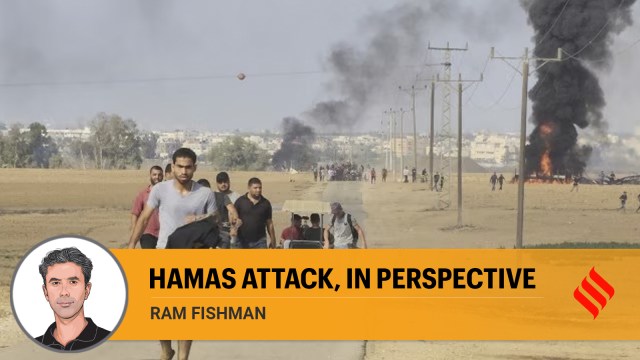
The Mumbai terror attacks, in which 10 gunmen murdered 164 people, including 147 civilians, have left a deep and lasting mark on the Indian national psyche.
Remembering these horrible crimes can be helpful in setting the October 7 Hamas attack on Israel in perspective, and appreciating the depth of the trauma it has inflicted on the Israeli psyche. Hamas’s attack involved at least 1,500 gunmen breaching a legitimate international border and slaughtering more than 1,400 people, of which around 1,000 were civilians, including countless elderly people, women and children.
The comparison cannot stop with this cold arithmetic. Just imagine that the Mumbai attackers would safely return to Pakistan while taking thousands of hostages to their hideouts. Recall the shock, fear, disgust, and anger that so rightfully gripped India 15 years ago, on 26/11. Now multiply it a hundredfold, and you will begin to understand the depth of the shock Israelis have experienced.
But it goes further. Imagine now that Mumbai was not part of a nation with a geographical extent of three million square kilometres and a population of more than one billion, but just a small state of its own. Imagine also that Lashkar-e-Toiba, the organisation that perpetrated the Mumbai attack was not based within Pakistan but was running its own state-like entity right on the border of Mumbai. And if you can stretch your imagination any further, imagine that on the night of November 26, 2008, it had also fired more than 2,000 rockets into Mumbai civilian neighbourhoods. And that LeT had thousands more terrorists, and an enormous remaining supply of weapons, explosives and rockets, which it could use at any time to launch additional attacks. If you can handle making this nightmarish scenario any worse, imagine that on the other side of Mumbai, another similar state-like entity was run by a similar terror organisation, except that it has 10 times the terrorists, weaponry and rockets, and could also launch a similar attack at any moment.
This seemingly unimaginable situation is what Israel is contending with right now. Hamas on one side, having demonstrated its capacity for barbaric slaughter, and Hezbollah on the other, already engaging in unprovoked missile attacks and openly preparing for a similar attack.
All this is not meant to justify this or any other course of action as a response. Rather, it is meant to offer a glimpse of the Israeli mindset, in a way that perhaps few can understand as well as Indians can.
The Indian response to the Mumbai attacks has been extensively debated since the attacks took place. But even those who consider it to be a wise and successful strategy should be able to appreciate that Israel may not be able to follow a similar path in this context.
The traumatised Israeli public is remarkably unified and determined in its refusal to allow Hamas to remain operational, just a few hundred meters from its border. It considers the survival of Hamas to be a recipe for additional attacks from several fronts. And it unequivocally demands that the Israeli army uproot Hamas at any cost.
This means that the best chance of minimising the civilian death toll in Gaza lies in making it clear to the Hamas leadership that its only path to survival lies in releasing all hostages, disarming, dismantling, and leaving Gaza for good. If the entire world had followed countries like India and the US in standing firmly on Israel’s side, it could actually shorten the war in Gaza. Instead, those countries, parties and individuals that are drawing false moral equivalency, demanding Israel ceasefire unconditionally, and justifying Hamas, while claiming to care about the plight of Palestinian civilians, are only prolonging it.
The writer is Professor of Public Policy, Tel Aviv University